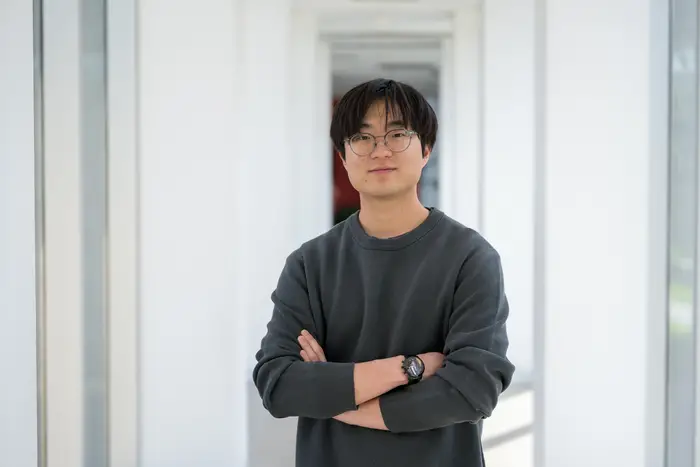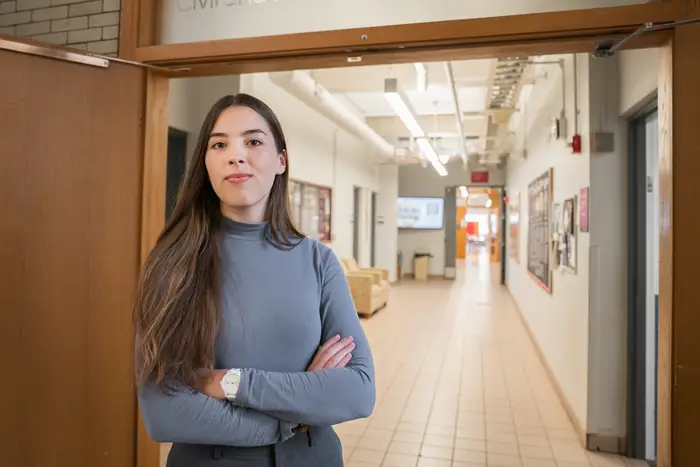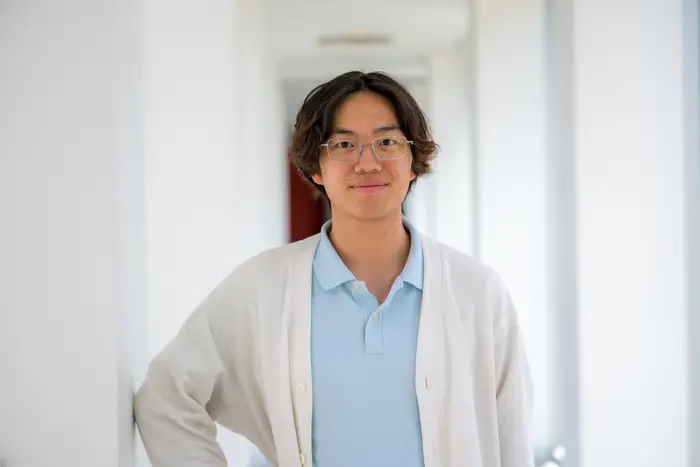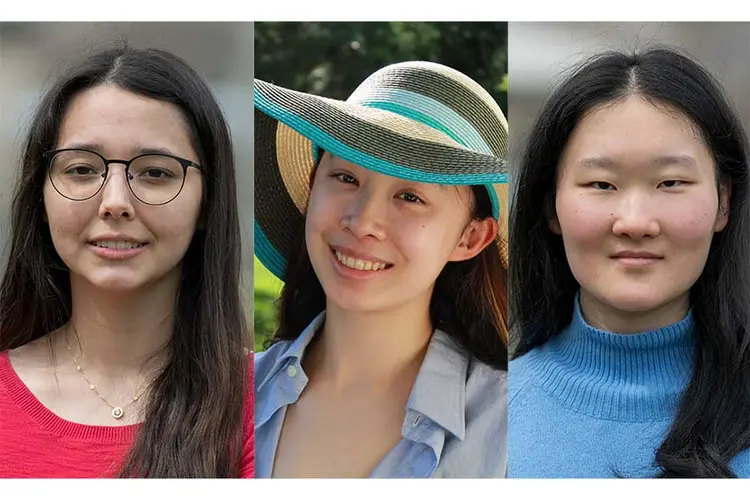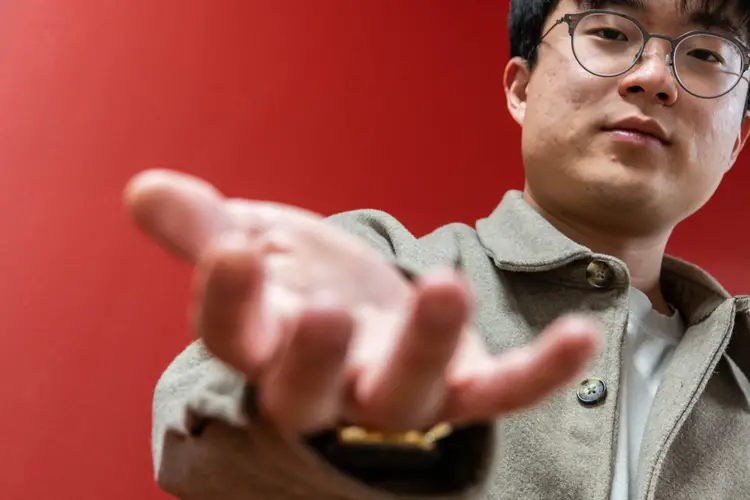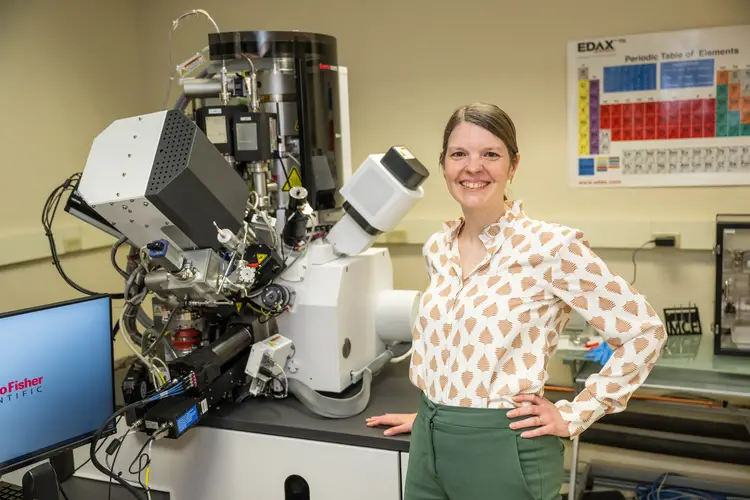Three CMU Students Awarded 2025 Goldwater Scholarship
Media Inquiries
Three Carnegie Mellon University students have been selected to receive the Barry Goldwater Scholarship(opens in new window) in 2025.
The awardees are Hyojae Park, a sophomore in the School of Computer Science; Jana Reiser, a third-year student in the College of Engineering(opens in new window); and Sheng Shu, a junior majoring in computer science and also studying chemistry in the Mellon College of Science(opens in new window). Park, Reiser and Shu were among those selected from a pool of over 5,000 applicants.
One of the most prestigious undergraduate scholarships in the science, technology, engineering and math (STEM) fields, the Goldwater Scholarship is awarded by the federally endowed Barry Goldwater Scholarship and Excellence in Education Foundation(opens in new window). It provides up to $7,500 per academic year to support costs such as tuition, fees, books, and room and board.
Carnegie Mellon’s Office of Undergraduate Research and Scholar Development(opens in new window) provides support to students as they search and apply for opportunities such as the Goldwater Scholarship.
“We are beyond proud of these three incredible student researchers,” said Alexander Johnson, scholar development coordinator within OURSD. “Throughout the nomination process, we were continually impressed by the clarity of their goals and their dedication to solving important global issues through research. Jana, Hyojae and Sheng have each already accomplished so much in their time at CMU, and we have no doubt they'll continue on as leaders in their respective fields. Each of them has immense potential as scientists and we're excited to see where their careers take them.”
Hyojae Park
Park traces his interest in computer science to third grade, when his elementary school hosted an Hour of Code event. He picked up a Java textbook afterward and started teaching himself.
Years later, that same curiosity guided his decision to attend CMU.
“I knew I wouldn’t be limited here,” he said. “The university offers depth in coursework and breadth in research opportunities. I can explore topics as deeply and widely as I want.”
One formative experience came in high school, when Park built a functional ray tracer — a program that simulates light to render images.
“I was fascinated that equations on paper could turn into something visual and interactive,” he said.
Now, his research focuses on robotics. He’s exploring methods for enabling rapid data generation of robotic hand movements from a single datapoint.
“I hope that my research will enable new formalizations and theoretical foundations to see how we can think about different problems in new ways, enabling us to develop creative solutions to difficult problems,” Park said.
Park earned the Goldwater Scholarship for research spanning multiple disciplines — cryptography, graphics, robotics, human-computer interaction and software engineering — with six publications and presentations at major conferences already on his résumé. The award comes with financial support and access to a national network of scholars. But for Park, it’s a signal that he’s on the right track.
“I think having to work across different subfields helped my application stand out,” Park said. “It shows that I really love the research process, not just a specific area.”
Outside the lab, Park has served as a teaching assistant for 15-122: Principles of Imperative Computation, three times. Sharing core concepts with hundreds of students has been one of his most rewarding experiences at CMU.
Though he’s still early in his academic career, Park plans to pursue graduate study in computer science and continue conducting research. His advice to others interested in a similar path?
“Stay curious. Find important problems. Ask for help when you need it. Start early.”
Jana Reiser
Reiser is a third-year student majoring in environmental engineering(opens in new window) with a minor in computational biology(opens in new window). Since the spring of her first year at Carnegie Mellon, she has worked in the lab of Gregory Lowry(opens in new window), the Hamerschlag University Professor of Civil and Environmental Engineering. There, she conducts research on potential applications of nanoparticle delivery systems to increase plant resilience.
Current practices for delivering fertilizers, pesticides or genes typically involve spraying, which leads to most of the chemicals ending up in runoff rather than being absorbed by the plant. Spraying nanoparticles instead of just the agrochemicals allows for targeted delivery and slow release of these agrochemicals to the plant.
Reiser’s work specifically concerns optimizing methods to get nanoparticles into plant cells using cell-penetrating peptides.
“It’s something that you can stick on the outside of the nanoparticle, and then it functions like a key that allows you to get through the membrane of the cell,” she explained.
Reiser had her eyes set on the research in Lowry’s lab even before she arrived at Carnegie Mellon, and says it motivated her decision to pursue her undergraduate studies here. In high school, she completed an architecture-related professional fellowship and internship before shifting her focus to her interests in biology. However, Reiser’s experiences in architecture helped her develop an environmental perspective, sparking her goals to conduct interdisciplinary research.
Outside the lab, Reiser is involved with the Sustainable Earth Club(opens in new window), where she does advocacy work. She also plays lacrosse, water polo and tennis, and plays violin in the All University Orchestra.
She plans to pursue a Ph.D. in environmental engineering(opens in new window), exploring relationships between plants and bacteria, and how they can be leveraged to enhance crop resilience, similar to nanoparticle delivery.
“Plants and bacteria do form a very complicated ecosystem with each other, especially in the soil, and I always thought that would be very interesting to study,” she said.
Learning that she had earned a Goldwater scholarship came as a very welcome surprise to Reiser.
“I honestly can’t believe it’s real, but I also think it’s validating, because it shows that my research is worth something.”
Alongside the financial support provided by the scholarship, Reiser is looking forward to the ability to consult the community of other scholars for guidance.
“The research that I want to do is very interdisciplinary, and a very new field, so it’s difficult to figure out what kind of programs I should go into for my Ph.D. And the best way to figure this out is to look at this network, figure out who else has done something similar to me, and ask them how they did it.”
Sheng Shu
Shu’s fascination with chemistry is rooted in curiosity about the fundamental aspects of the natural world. Over time, that interest grew to include computer science, which offered new tools for examining chemical systems.
“My research journey began here at CMU, where I was drawn in by the sheer number of undergraduate research opportunities and the supportive culture around them,” Shu said.
He first worked in Associate Professor of Chemistry Isaac Garcia-Bosch(opens in new window)’s lab, conducting wet-lab chemical research before pivoting to computational chemistry — a rapidly evolving field that blends scientific discovery with the scale and precision of computer science. Since then, he performed research with Fang Bai, an assistant professor at ShanghaiTech University, and currently works in the lab of Olexandr Isayev(opens in new window), the Carl and Amy Jones Professor in Interdisciplinary Science in CMU's Department of Chemistry(opens in new window).
One of Shu's personal milestones in the lab has been a defining moment in his education so far: building and testing a model that could generate de novo molecules — molecules designed and generated from scratch.
“It was the first bridge I built myself between the two fields,” he said.
His current research focuses on molecular representation. Specifically, developing a model that encodes molecules into a fixed number of values, despite the near-infinite complexity of molecular features. This work could improve machine learning applications in chemistry, such as predicting molecular properties and behaviors.
“I hope scientists from all fields can use the research I conduct to accelerate their work,” Shu said.
In addition to research, Shu contributes to the CMU community as a teaching assistant for Principles of Imperative Computation and enjoys participating in hackathons with friends. After graduation, he plans to pursue a Ph.D. and continue working at the intersection of chemistry and computer science.
Reflecting on the scholarship, Shu said he's most excited to connect with other scholars and expand his understanding of new research directions.
“The Goldwater was an accumulation of everything I’ve worked on so far,” he said. “It’s exciting to see what’s possible.”
